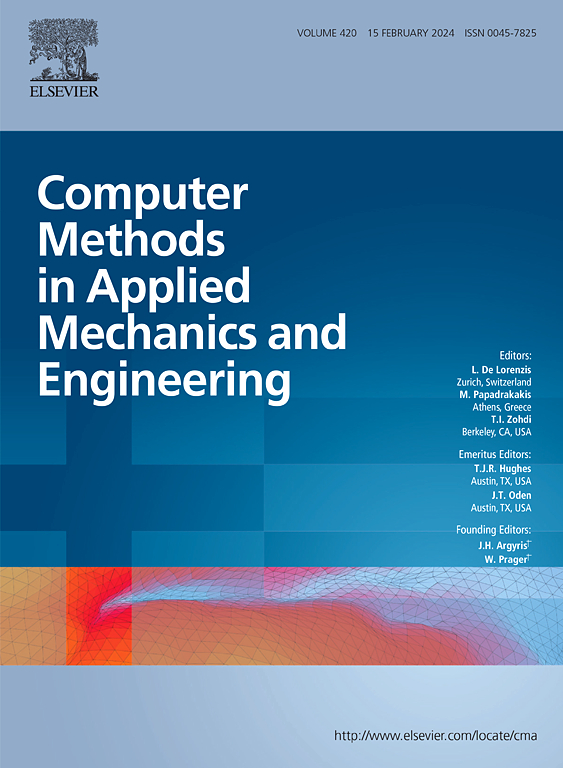多材料拓扑优化中的多值整数编程方法:随机离散最陡降法(RDSD)算法
IF 6.9
1区 工程技术
Q1 ENGINEERING, MULTIDISCIPLINARY
Computer Methods in Applied Mechanics and Engineering
Pub Date : 2024-10-17
DOI:10.1016/j.cma.2024.117449
引用次数: 0
摘要
本研究将多材料拓扑优化问题建模为多值整数编程(MVIP),或称为组合优化。通过将经典的凸分析和凸编程扩展到离散点集函数,引入了离散凸分析和离散最陡降法(DSD)算法。为了克服 DSD 算法的组合复杂性,我们采用了顺序近似整数编程(SAIP)来显式线性近似隐式目标函数和约束函数。考虑到多值设计变量的多个潜在变化方向,我们提出了随机离散最陡降法(RDSD)算法,通过随机策略来选择确定的变化方向。为了分析计算多材料离散变量的敏感性,应用了具有材料对比度的拓扑导数。总之,MVIP 最终被转换为线性 0-1 程序,可通过典型松弛算法 (CRA) 高效求解。显式非线性实例表明,与商业软件(GUROBI)相比,RDSD 算法拥有近三个数量级的改进。在不使用任何连续变量松弛和插值惩罚方案的情况下,所提出的方法成功地解决了最小顺应性问题、强度相关问题和频率相关优化问题。考虑到算法的效率、数学通用性以及与其他算法相比的优点,所提出的 RDSD 算法对其他涉及多值离散设计变量的结构和拓扑优化问题很有意义。本文章由计算机程序翻译,如有差异,请以英文原文为准。
Approach for multi-valued integer programming in multi-material topology optimization: Random discrete steepest descent (RDSD) algorithm
The present study models the multi-material topology optimization problems as the multi-valued integer programming (MVIP) or named as combinatorial optimization. By extending classical convex analysis and convex programming to discrete point-set functions, the discrete convex analysis and discrete steepest descent (DSD) algorithm are introduced. To overcome combinatorial complexity of the DSD algorithm, we employ the sequential approximate integer programming (SAIP) to explicitly and linearly approximate the implicit objective and constraint functions. Considering the multiple potential changed directions for multi-valued design variables, the random discrete steepest descent (RDSD) algorithm is proposed, where a random strategy is implemented to select a definitive direction of change. To analytically calculate multi-material discrete variable sensitivities, topological derivatives with material contrast is applied. In all, the MVIP is finally transferred as the linear 0–1 programming that can be efficiently solved by the canonical relaxation algorithm (CRA). Explicit nonlinear examples demonstrate that the RDSD algorithm owns nearly three orders of magnitude improvement compared with the commercial software (GUROBI). The proposed approach, without using any continuous variable relaxation and interpolation penalization schemes, successfully solves the minimum compliance problem, strength-related problem, and frequency-related optimization problems. Given the algorithm efficiency, mathematical generality and merits over other algorithms, the proposed RDSD algorithm is meaningful for other structural and topology optimization problems involving multi-valued discrete design variables.
求助全文
通过发布文献求助,成功后即可免费获取论文全文。
去求助
来源期刊
CiteScore
12.70
自引率
15.30%
发文量
719
审稿时长
44 days
期刊介绍:
Computer Methods in Applied Mechanics and Engineering stands as a cornerstone in the realm of computational science and engineering. With a history spanning over five decades, the journal has been a key platform for disseminating papers on advanced mathematical modeling and numerical solutions. Interdisciplinary in nature, these contributions encompass mechanics, mathematics, computer science, and various scientific disciplines. The journal welcomes a broad range of computational methods addressing the simulation, analysis, and design of complex physical problems, making it a vital resource for researchers in the field.

 求助内容:
求助内容: 应助结果提醒方式:
应助结果提醒方式:


